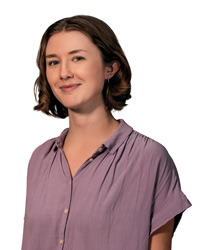Alumni Spotlight: Leslie Butsch
Leslie Butsch, MSW 2018
Field Director, ACLU of Kansas
Leslie Butsch started her career as a direct social worker. In roles as a case manager and advocate within the foster care system and in a domestic violence shelter, Butsch said she began to see the gaps in the systems her clients interacted with.
 “I found myself really radicalized by the systems that folks were interacting with. Especially because these social safety net systems that we work within, I often saw them harming the people that I worked with,” Butsch said.
“I found myself really radicalized by the systems that folks were interacting with. Especially because these social safety net systems that we work within, I often saw them harming the people that I worked with,” Butsch said.
Butsch graduated from KU in 2018 with a Master of Social Work (MSW) with a specialization in social work macro practice. She is currently the field director at the ACLU of Kansas and has been an organizer for various organizations since graduating.
“One of the Code of Ethics is that we will challenge social injustice and pursue social change. I think macro social work is really where we learn the tools to do that,” Butsch said.
Butsch shared her experience with KU’s MSW macro specialization program for a Q&A.
Video editing and graphics by: Lizbeth Villanueva
Q&A with Leslie Butsch
What drew you to social work?
In searching for how I, as an individual, could do something about the social safety net and the gaps I saw, the macro program made sense because that's where you do the work upstream in determining who the power holders to change policies and develop programs are. That sort of thing really called to me as a solution for the problems that I saw, and that brought me to organizing.
What does your work look like today? The term macro social work - what does that mean you do for a living?
I am an organizer. My role is to build relationships and transform the landscape of power through relationship-building and through developing leadership.
As an organizer, I identify a problem alongside a community, whether it's a policy change or a political problem, and facilitate a community's leadership to solve that problem.
What’s the most rewarding part of social work?
I had an incredible opportunity to play a leadership role in the field strategy to defeat the anti-abortion amendment in August of 2022 in Kansas. …
Reproductive justice, to me, was really part of how people can live their full lives. … To me, defeating the amendment was the equitable thing to do to build a better future in Kansas. But also, we engaged over 4,000 volunteers from across the entire country and outside of the U.S., too, and all of those individual people got to play a role in that.
How has your KU Macro MSW degree played a role in equipping you for your work today?
That sort of intimate awareness of the web of systems that people have to navigate. I have an understanding of that. …
The work I do now is really zoomed out. It’s not an individual one-on-one conversation with a client. … But it’s how do we change this problem and find a solution for the long term. And I can bring both of those perspectives because of my macro specialization.
What should aspiring social workers know about macro practice?
I would say macro social work is not just administrative stuff. I think that it can be a lot of fun. I think that macro social work can be empowering. … It's an opportunity to reorganize our relationship to power, to think creatively about how we can build a new system.
And the macro social work specialization gives us those tools. Whether it’s developing a program or organizing a community to change a policy, macro social work is reimagining to build a vision for a better future. … It gives us the tools to do that.
This is the first article in a Q&A series featuring KU Master of Social Work graduates who completed a specialization in social work macro practice. Learn more about the master's degree program on the Master of Social Work program overview page.